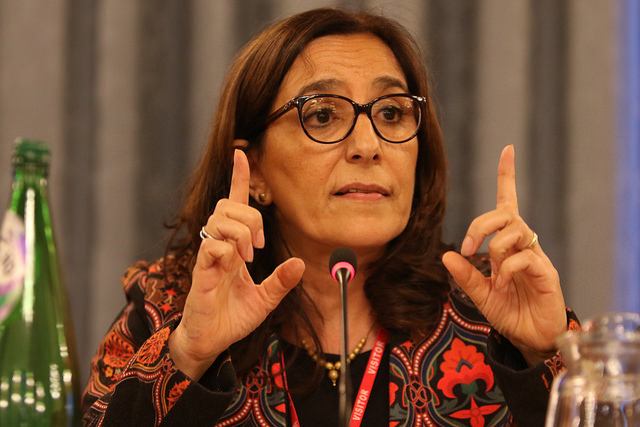File photograph of Mona Rishamawi (Photograph: Foreign and Commonwealth Office)
The Chief of the Rule of Law, Equality and Non-Discrimination Branch of the UN Office at the High Commissioner for Human Rights (OHCHR) said Sri Lanka’s current justice system is “slow and it’s not delivering” in an interview earlier this week.
Speaking to The Morning Mona Rishmawi said emblematic cases “are blocked because of the local justice system” and called on Sri Lanka to comply with a UN resolution that mandates foreign judges participating in an accountability mechanism.
“Resolution 30/1 proposes obtaining foreign assistance,” she said. “If Sri Lanka is not prepared to do so, then they must propose an alternative. Focusing on the nationality of the judge is not important but what is important is how to unblock this accountability problem. We need to see that justice is done. Right now, we see the process is slow and it’s not delivering.”
Whilst she said that there had been “positive steps” by Colombo, she said Sri Lanka should “refocus attention on the implementation of this Resolution”.
“I think we can refocus attention on the implementation of this Resolution. What has happened over the last few days is a little distraction. Instead of saying we have something positive to work with the international community on; there is a distraction on what was said and what was not said. This is not helpful because the Resolution is the Resolution and the report by the High Commissioner is very clear; and the High Commissioner stands by her report.”
“The recommendations are basically an agreed framework. What we want to see is if the recommendations will be implemented or not. So you have a baseline which is Resolution 30/1 and we now see what has been implemented and how we can make sure the rest are implemented so Sri Lanka looks good”.
“That is what we have been asked to do. The High Commissioner has been asked to continue to assess the progress in the implementation of the recommendations in the Resolutions, particularly 30/1 of 2015. That is really our role.”
Rishmawi concluded by saying,
“If the Government does not want us to be there, then what is their alternative? Doing nothing is not an alternative.”
See the full text of her interview here.
Her comments come after several Sri Lankan leaders, including the president, have publicly rejected the terms of the UN resolution, which includes the setting up of a hybrid accountability mechanism. Sri Lanka’s foreign minister earlier told the UN Human Rights Council that his government would not allow foreign judges to participate in such a mechanism.
We need your support
Sri Lanka is one of the most dangerous places in the world to be a journalist. Tamil journalists are particularly at threat, with at least 41 media workers known to have been killed by the Sri Lankan state or its paramilitaries during and after the armed conflict.
Despite the risks, our team on the ground remain committed to providing detailed and accurate reporting of developments in the Tamil homeland, across the island and around the world, as well as providing expert analysis and insight from the Tamil point of view
We need your support in keeping our journalism going. Support our work today.
For more ways to donate visit https://donate.tamilguardian.com.


